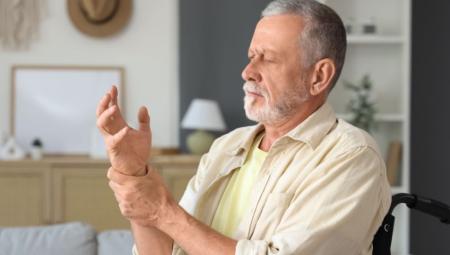Background
Distress is common for people with dementia on hospital mental health wards, but music might help. People may become distressed due to symptoms like hallucinations or because their care does not meet their needs. If distress leads to behaviour that puts themselves or others at risk, they may be admitted to a hospital mental health ward. The goal of admission is to manage distress and enable discharge with appropriate support, but this can take a long time.
These specialist wards are different from general hospital wards or care homes, and there is little research on how best to support patients. Caring for someone who is frightened and distressed is challenging, and both staff and patients can get hurt. Staff on these wards experience more physical assaults than prison officers. Calming medications such as antipsychotics are often used but can increase the risk of falls and death.
Music therapy has been shown to reduce distress for people with dementia in care homes, but its benefits on mental health wards are less well understood. Our research found fewer assaults on days when music therapy took place, and staff observed a positive impact. However, access to music therapy varies across NHS wards.
In this eighteen-month project, we developed a music therapy manual for mental health wards with people with dementia, their families, and staff. We:
1. Talked to people with dementia, relatives, and staff about managing distress and assaults.
2. Co-created a music therapy manual (MELODIC) based on these findings.
3. Piloted the manual on two mental health wards and refined it. We found that the intervention was feasible to deliver and the research methods used were acceptable to patients, relatives and staff.
Now complete, the manual has been shared with the public, and we plan to test it on more wards.
Project Aims
- To co-design a music therapy protocol and guide, with accompanying programme theory, to reduce distress on NHS inpatient mental health dementia wards
- To pilot the intervention on 2 NHS wards with differing experiences of music therapy to enable theory and intervention refinement, and to test the feasibility of outcome measures in this setting
Project Activity
Two literature reviews have been conducted to date:
- A systematic review of psychosocial interventions in inpatient mental health dementia wards has enabled us to look at outcomes, characteristics and facilitators and barriers to implementing interventions in this setting (Thompson et al., 2023, paper under review)
- A realist review of music therapy in advanced dementia care has enabled the development of a programme theory of how and why music therapy can reduce distress and improve wellbeing for people with advanced dementia in non-community care settings.
The following research activities were completed by the completion of the project:
- Talking to people with dementia, relatives and staff with experience of mental health wards in focus groups and interviews. This will help us understand how distress is currently managed and the support people need. We will also ask about the ways that music, and music therapy if offered, are currently used on the wards.
- Co-creating a music therapy manual with people with dementia, relatives and staff based on findings from the reviews and focus groups. This will be done through a co-design workshop, followed by an iterative process of refinement where the co-design group will be sent draft versions of the manual for feedback.
- Testing the music therapy manual over four weeks on a mental health ward that already has music therapy. Following this pilot, we will make changes to the music therapy manual based on our findings and feedback.
- Testing the music therapy manual over four weeks on a mental health ward that has never offered this before. This will help us see how the intervention works in a place that is unfamiliar with music therapy, and make additional changes to improve the manual.
Outputs
The MELODIC study successfully developed and piloted a manualised music therapy intervention for distress management in NHS inpatient dementia wards. Findings suggest that structured music interventions can be embedded into routine care with adequate training and institutional support.
The study generated theoretical, practical, and implementation insights, forming the foundation for a future cluster randomised controlled trial to assess the intervention’s clinical effectiveness and scalability across NHS settings.
Implications
- The intervention offers a non-pharmacological, scalable approach to managing distress in dementia care.
- Findings inform best practices for training and supporting staff in implementing music therapy interventions.
- The study highlights the importance of embedding music-based interventions within existing ward structures to ensure sustainability.
Papers and Resources
Webpage: MELODIC: Music therapy Embedded in the Life Of Dementia Inpatient Care - ARU
- Protocol for a systematic review: PROSPERO CRD42023429983
- Protocol for a realist review: PROSPERO CRD42023409635
- Thompson, N., Iyemere, K., Underwood, B. R. and Odell-Miller, H. (2023) 'Investigating the impact of music therapy on two in-patient psychiatric wards for people living with dementia: retrospective observational study', BJPsych Open, 9(2), e42.]
- Thompson, N. and Odell-Miller, H. (2022) 'An audit of music therapy in acute National Health Service (NHS) settings for people with dementia in the UK and adaptations made due to COVID-19', Approaches: An Interdisciplinary Journal of Music Therapy.
- Thompson, N., Odell-Miller, H., Pointon, C., Underwood, B.R., Wolverson, E. and Hsu, M.H., 2024. Music therapy Embedded in the Life Of Dementia Inpatient Care (MELODIC) to help manage distress: A mixed methods study protocol for co-designing a complex intervention. Nordic Journal of Music Therapy, pp.1-17.
- Thompson, N., Odell-Miller, H., Underwood, B.R., Wolverson, E. and Hsu, M.H., 2024. How and why music therapy reduces distress and improves well-being in advanced dementia care: a realist review. Nature Mental Health, pp.1-11.
- Thompson, N., Hsu, M. H., Odell-Miller, H., Underwood, B. R., and Wolverson, E., 2024a. Characteristics, outcomes, facilitators, and barriers for psychosocial interventions in inpatient mental health dementia wards: a systematic review. BMC Geriatrics, 24(1), 364.
Click here to read final report
MELODIC handout sharing event
Who was involved?
- Chief Investigator: Dr Ming-Hung Hsu, Anglia Ruskin University
- Co-chief Investigator: Prof Helen Odell-Miller, Emeritus, Anglia Ruskin University
- Principle Investigator: Dr Ben Underwood, Cambridgeshire and Peterborough NHS Foundation Trust, University of Cambridge
- Principle Investigator: Dr Emma Wolverson, University of Hull, Dementia UK
- Research coordinator: Naomi Thompson, Anglia Ruskin University (corresponding researcher)
- Public research member: Chris Pointon
Contact
Ben Underwood- Ben.Underwood@cpft.nhs.uk





